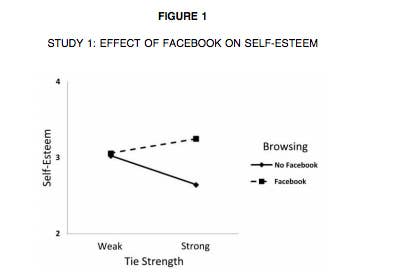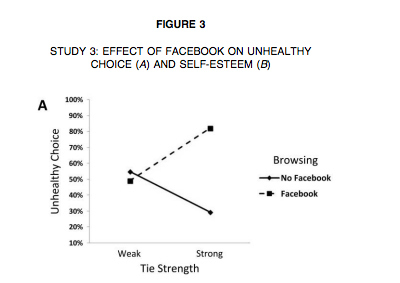
If December hasn't been your most disciplined month to date — I, for instance, have purchased more tree ornaments than is reasonable, and this morning I watched either nine or fourteen YouTube videos of K-pop group Big Bang — and you need a new culprit, you might consider blaming Facebook. Just don't be surprised if nobody buys it.
Professors and researchers Keith Wilcox and Andrew T. Stephen recently published an article entitled "Are Close Friends the Enemy? Online Social Networks, Self-Esteem, and Self-Control" in the Journal of Consumer Research, proposing that active Facebook use tailored toward enhancing one's self-image with close friends contributes to increased self-worth, which, in turn (somewhat confusingly), leads to loss of self-control.
In other words: When you log onto Facebook and, while there, consider what your closest Facebook buddies think of you, that social media experience heightens your self-worth. Which — allegedly — contributes to a declining self-control.
Their hypothesis was as follows: "We propose that while social network use does make people feel better about themselves, these increased feelings of self-worth can have a detrimental effect on behavior." If it sounds like a weird study, that's because it is.
The researchers allege their study finds that "greater social network use is associated with a higher body mass index, increased binge eating, a lower credit score, and higher levels of credit card debt for individuals with strong ties to their social network." So should you quit Facebook?

Not really.
Here is how this rather dubious study was run: Participants were asked either to focus on "strong ties" (by listing their five closest friends and to what extent those friends' opinions mattered to them) or on "weak ties" (by listing their five most distant Facebook friends and their corresponding opinions' worth). Half of each group was assigned to either the control group or the experiment group.
The study's experimental group was instructed to log onto Facebook for just five minutes (!) and assess their self-worth in a quiz immediately following. The control group merely wrote about browsing Facebook for five minutes (they did not actually go on Facebook). The results showed that the participants focused on strong ties who actually went on Facebook rated their self-worth more highly that those who only wrote about being on Facebook. (There was no difference for those focused on weak ties). But because there was no measure taken of participants' self-worth prior to the experiment, it seems like a fairly major leap to assume the quiz measured an enhanced self-worth that could be attributed to Facebook use itself.

An additional experiment presented in this study asked participants to browse either CNN (the control group) or Facebook (the experimental group) for five minutes and to then choose between a healthy snack (a granola bar) or an unhealthy option (a cookie). Researchers found that among participants focused on self-image regarding close Facebook friends, those who browsed Facebook for five minutes were more likely to want cookies than were those who browsed CNN for five minutes — which is one of those things you wish statisticians would say out loud to see what it sounds like before putting it in an academic journal. "Spending five minutes on Facebook makes you eat a cookie instead of a granola bar." Ah, that sounded silly, I'm sorry.
The study also makes a lot of gross assumptions about what it means to lack self-control — being overweight or poor, mostly. Wilcox and Stephen write that "poor self-control is associated with making unhealthier food choices and a greater likelihood of engaging in binge eating." They also note that they "asked participants their height and weight so that we could calculate their body mass index (BMI), which is a widely used proxy for human body fat (Mills 2008)." BMI may be widely used, but it's also a controversial and often discredited measure of one's status as "overweight," and it seems problematic, TO SAY THE LEAST, to attribute each pound of one's body to a misstep from the path of righteousness.
Wilcox and Stephen also note that study participants with strong Facebook ties who reported higher levels of Facebook usage were also found to have higher credit card debt, implying that spending all that time on Facebook is what's keeping you poor. However, neither this finding nor the supposed link between Facebook use and BMI use statistics that control for other likely contributing factors, like weight change over time, type of employment (sedentary work, a potential interacting variable, could cause both weight gain and increased Facebook usage), or whether or not the participant is unemployed (which could lead to both higher Facebook usage and higher credit card debt). Nor does it establish a chronological order to the events behaviors studied — these data were collected in a snapshot survey, failing to examine whether long-term Facebook use changes any of the dependent variables mentioned.
In short: Wilcox and Stephen have found nothing worth quitting Facebook over. Have a cookie.

